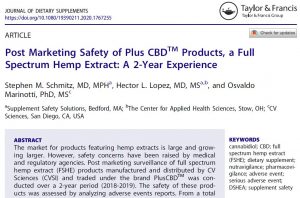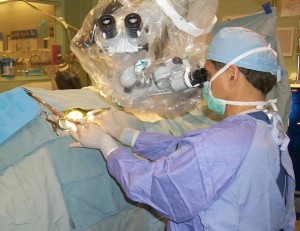New CBD Study Reviews Safety
 June 17, 2020 Despite many centuries of human use it is only recently, in the last 50 years, that the human benefits of hemp, CBD, and other bioactive molecules it contains have been scientifically studied. American chemist, Roger Adams, was the first to isolate cannabidiol (CBD) from hemp oil in 1942. Human studies in the US were slowed do to the change in the legal status of hemp in 1937 that made it and marijuana illegal to grow or possess. It is only been within the last 10 to 15 years that several large scale human studies on CBD have be reported that focused on safety.
June 17, 2020 Despite many centuries of human use it is only recently, in the last 50 years, that the human benefits of hemp, CBD, and other bioactive molecules it contains have been scientifically studied. American chemist, Roger Adams, was the first to isolate cannabidiol (CBD) from hemp oil in 1942. Human studies in the US were slowed do to the change in the legal status of hemp in 1937 that made it and marijuana illegal to grow or possess. It is only been within the last 10 to 15 years that several large scale human studies on CBD have be reported that focused on safety.
According to the World Health Organization (WHO), in 2017, they reported, ” “In humans, CBD exhibits no effects indicative of any abuse or dependence potential…. To date, there is no evidence of public health related problems associated with the use of pure CBD.”
The hemp-derived CBD in stores and online is certainly not pure CBD. Sold as a dietary supplement, it generally has numerous other plant compounds and processing chemicals within the formulation. This is a significant concern by both consumers and healthcare providers in that these “other” components and general lack of purity standards may cause unknown reactions in the consumer. In addition, studies that have investigated high dose CBD have reported concerns that might alter liver function.
New CBD Safety Safety Demonstrates Few Adverse Reactions
A recent, June 2020, study of reported adverse reactions for a unique company’s CBD products was recently published by Schmitz, et al. This study is rare, as there are hundreds of companies that
produce hemp-based CBD products at the wholesale level and thousands that retail various brands to the public. Despite Federal product safety recording, not all actually track adverse reactions and even fewer have reported their results. This tracking is called post marketing surveillance and was collected in products made by CV Sciences (CVSI) under the brand PlusCBD™ for a 2-year period (2018-2019). For the last 7 years I have been scientific advisor for CVSI and for the last 2 years I have had the privilege to be a board member.
From a total of approximately five million CBD product units sold during the 2-year period, 1,429 (0.03%) adverse events (AE) were reported in 1,151 unique customers. For orally ingested products, the most common types of AEs reported were gastrointestinal (e.g. abdominal discomfort), while for topically (skin) applied products, the most reports mentioned were rashes. One of the most important findings the study also reported on was possible interaction of CBD and liver enzymes. Theoretically, there is a potential of CBD to interfere with specific liver enzymes that are also responsible for the breakdown of certain medications. In this safety report there was no evidence of liver toxicity associated with CVSI products.
Why Changes in Liver Enzymes and CBD Could be a Concern
Although, any AE from a dietary supplement is concerning, many health professionals have focused on reports of the potential interaction of CBD and the liver enzymes that breakdown certain
prescription drugs. A drug is tested to last for a certain amount of time in the body. Once it is broken down then the patient takes another dose. But if a drug is not being removed fast enough, because the liver enzyme used to break it down is already being used to break down CBD, then there is a potential that the patient may overdose on the drug.
A prior study that discussed the potential of CBD to stress liver function was from a 2018 US FDA approved drug called Epidiolex. In this study to obtain FDA approval they reported in 16% of patients in their clinical trial had higher liver enzymes (which is a sign of liver stress). Epidiolex is a purer form of CBD derived from marijuana and is dosed in very high amounts compared to much smaller amounts found in dietary supplements that contain hemp derived CBD. Epidiolex is approved for the treatment of seizures associated with two rare and severe forms of epilepsy, Lennox-Gastaut syndrome and Dravet syndrome, in patients two years of age and older. From this recent Schmitz, et al study they noted Epidiolex doses were up to a 100-fold higher than the recommended dose of PlusCBD™ Oil (i.e. 15 mg CBD).
So, in summary, at least for this one manufacturer, their data demonstrated a significant safe profile using CBD for the majority of users.
Source: Post Marketing Safety of Plus CBD™ Products, a Full Spectrum Hemp Extract: A 2-Year Experience




 Dr. Maroon received an athletic scholarship to Indiana University in Bloomington, Indiana where as an undergraduate, he was named a Scholastic All-American in football. Dr. Maroon has successfully maintained his personal athletic interests through participation in 9 marathons and more than 72 Olympic-distance triathlon events. However, his greatest athletic accomplishment is his participation in 8 Ironman triathlons (Hawaii – 1993, 2003, 2008, 2010, 2013; Canada – 1995; New Zealand – 1997; Germany – 2000), where he usually finishes in the top 10 of his age group. Recently, in July 2012 and 2013, he finished second and third, respectively, in his age group in the Muncie, Indiana half Ironman triathlon. In October 2013 he completed his 5th World Championship Ironman in Kona, Hawaii.
Dr. Maroon received an athletic scholarship to Indiana University in Bloomington, Indiana where as an undergraduate, he was named a Scholastic All-American in football. Dr. Maroon has successfully maintained his personal athletic interests through participation in 9 marathons and more than 72 Olympic-distance triathlon events. However, his greatest athletic accomplishment is his participation in 8 Ironman triathlons (Hawaii – 1993, 2003, 2008, 2010, 2013; Canada – 1995; New Zealand – 1997; Germany – 2000), where he usually finishes in the top 10 of his age group. Recently, in July 2012 and 2013, he finished second and third, respectively, in his age group in the Muncie, Indiana half Ironman triathlon. In October 2013 he completed his 5th World Championship Ironman in Kona, Hawaii.